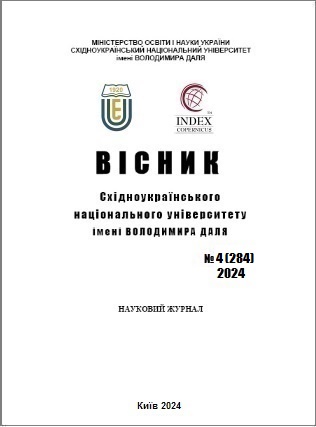The potential of universities to support the implementation of the circular economy in the post-complete recovery of Ukraine
DOI:
https://doi.org/10.33216/1998-7927-2024-284-4-55-62Keywords:
circular economy, post-war recovery, environmental impact, university potential, sustainable developmentAbstract
The war in Ukraine has caused significant environmental problems, such as soil and water pollution, destruction of natural habitats for flora and fauna, and the destruction of agroecosystems. These problems require a comprehensive approach to address them, and the circular economy offers effective methods to reduce waste, save resources, restore ecosystems and develop sustainable lifestyles.
Recent research in the field of circular economy confirms its significant potential as an innovative approach to sustainable development. Scientific publications focus on the economic, environmental, innovative, and social benefits of the circular economy, which allows for more efficient use of resources and reduced costs.
However, despite the significant benefits, the implementation of the circular economy faces a number of challenges, such as technological limitations, insufficient recycling infrastructure and the high cost of transition from a linear to a circular model.
The paper examines the main environmental impacts of the war in Ukraine, including soil and water pollution, destruction of natural habitats and the destruction of agro-ecosystems. To overcome these challenges, it is necessary to actively engage various sectors of society, including educational institutions, business and government agencies.
Particular attention is paid to the potential of the Volodymyr Dahl East Ukrainian National University to implement the circular economy. The university carries out research, education and training, outreach activities, cooperates with government organisations, international partners, businesses and communities to implement the principles of the circular economy.
It is shown that the Volodymyr Dahl National University of Kyiv can become a leading regional centre for research in the field of circular economy, developing new technologies and methods for waste recycling, bioremediation, water treatment and soil restoration.
The paper proposes directions for developing the potential of the Volodymyr Dahl National University of Kyiv to support the implementation of the circular economy in the post-war recovery of Ukraine. Through the integration of research, education, training, outreach and cooperation with various stakeholders, the university can become a powerful driver of change for sustainable development and recovery of the country.
References
Ellen Mac Arthur Foundation. (2017). A new plastics economy: Rethinking the future of plastics. URL: https://www.ellenmacarthurfoundation.org/the-new-plastics-economy-rethinking-the-future-of-plastics.
European Commission. (2018). European Strategy for Plastics in a Circular Economy. European Com-mission. URL: https://ec.europa.eu/environment/pdf/circulareconomy/plastics-strategy-brochure.pdf.
Organisation for Economic Co-operation and Devel-opment. (2016). Policies for a Circular Economy: Moving from Theory to Practice. URL: https://www.oecd.org/regional/cities/circular-economy-cities.htm.
Towards a Circular Economy. United Nations Envi-ronment Programme.URL: https://www.unep.org/circularity.
McKinsey & Company. (2017). Circular economy: An intelligent approach to resource scarcity. URL: https://www.mckinsey.com/capabilities/sustainability/our-insights/the-circular-economy-moving-from-theory-to-practice.
Geissdoerfer, M., Savaget, P., Bocken, N. M., &Hultink, E. J. (2017). The Circular Economy – A new sustainability paradigm? Journal of cleaner pro-duction, 143, 757-768. URL: https://www.researchgate.net/publication/311776801_The_Circular_Economy_-_A_new_sustainability_paradigm.
Murray, A., Skene, K., & Haynes, K. (2017). The Circular Economy: An Interdisciplinary Exploration of the Concept and Application in a Global Context. Journal of Business Ethics. URL: https://www.researchgate.net/publication/277882796.
WasteandResourcesActionProgramme (2016). The economic case for circul are conomy: Evidencefrom UK businesses. URL: https://www.wrap.ngo/taking-action/climate-change/circular-economy.
InternationalEnergyAgency (2019). Material efficiency in clean energy transitions. URL: https://www.iea.org/reports/material-efficiency-in-clean-energy-transitions.
Circular Economy and Technological Innovation (2023). A specialissueof Sustainability. URL: https://www.mdpi.com/journal/sustainability/special_issues/ceti.
Padilla-Rivera, A., Russo-Garrido, S., & Merveille, N. (2020). Addressing the Social Aspects of a Circular Economy: A Systematic Literature Review. Sustainability, 12(19), 7912. URL: https://www.mdpi.com/2071-1050/12/19/7912.
Zavos, S., Lehtokunnas, T. &Pyyhtinen, O. The (missing) social aspect of the circular economy: a review of social scientific articles. Sustain Earth Reviews 7, 11 (2024). URL: https://sustainableearthreviews.biomedcentral.com/articles/10.1186/s42055-024-00083-w.
Iacovidou, E., Hahladakis, J.N. & Purnell, P. A sys-tems thinking approach to understanding the chal-lenges of achieving the circular economy. Environ Sci Pollut Res 28, 24785–24806 (2021). URL: https://doi.org/10.1007/s11356-020-11725-9https://link.springer.com/article/10.1007/s11356-020-11725-9#citeas.
Nikolaou, I.E., Jones, N. & Stefanakis, A. Circular Economy and Sustainability: the Past, the Present and the Future Directions. Circ.Econ.Sust. 1, 1–20 (2021). URL:https://link.springer.com/article/10.1007/s43615-021-00030-3#citeas.
Chhimwal, M., Agrawal, S., & Kumar, G..Challenges in the implementation of circular economy in manufacturing industry. Journal of modelling in management, 29 Nov 2022, Vol.17,Issue 4,pages1049–1077 URL: https://www.researchgate.net/publication/349502891_Challenges_in_the_implementation_of_circular_economy_in_manufacturing_industry.
Hamza Hassan, H., &Faggian, R. (2023)..System thinking approaches for circulare conomy: enablinginclusive, synergistic, and eco-effective path ways for sustainable development. Front. Sustain., Sec. CircularEconomy. Volume 4 - 2023 URL: | https://doi.org/10.3389/frsus.2023.1267282https://www.frontiersin.org/journals/sustainability/articles/10.3389/frsus.2023.1267282/full.
Веб- сайт Східноукраїнського національного університету імені Володимира Даля URL: https://snu.edu.ua/.

